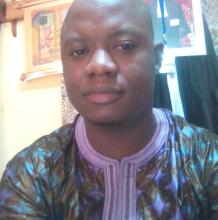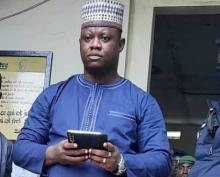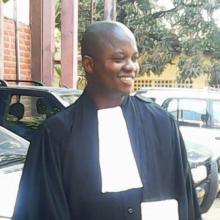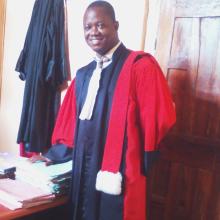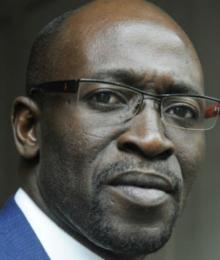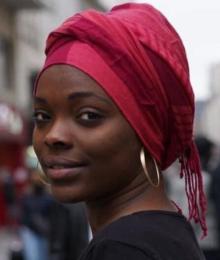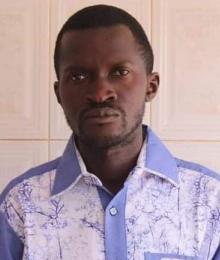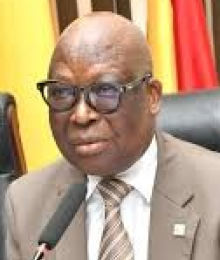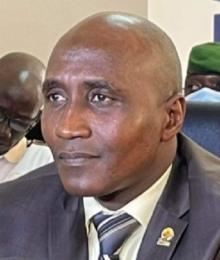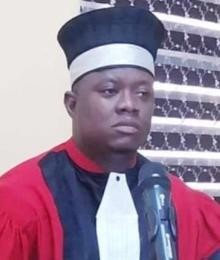
Alphonse Charles Wright is a prominent figure in Guinean politics today and has been serving as the Minister of Justice and Human Rights since 2022.
Born in Boke, Guinea in 1981, Wright grew up in a family of lawyers and was exposed to the legal profession from a young age. He pursued his studies in Private Law and went on to earn many diplomas in International Law.
With his extensive knowledge and experience in the legal field, Wright has become a well-respected figure in Guinean politics and is known for his commitment to upholding the rule of law and promoting human rights.
Throughout his career, he has worked tirelessly to ensure that justice is served and that the rights of all Guineans are protected.
In this biography, we will explore the life and accomplishments of Alphonse Charles Wright, from his early years to his current role as Minister of Justice and Human Rights.
I. Introduction
Alphonse Charles Wright, current Guinean Minister of Justice and Human Rights, and former Attorney General at the Court of Appeal of Conakry, is a well-reputed lawyer.
Graduated from “Université Général Lansana Conté” of Sonfonia, where he earned a degree in Private Law, Charles Wright made a name, first in Macenta then in Kankan before returning to Conakry. Throughout his career, Wright has been a strong advocate for human rights and has worked to improve the justice system in Guinea.
A. Who is Alphonse Charles Wright?
Alphonse Charles Wright is a prominent figure in Guinea's political and legal landscape today. He is widely recognized for his contributions to the country's justice system and his unwavering commitment to promoting and protecting human rights.
As the Minister of Justice and Human Rights, Wright has played a pivotal role in implementing legal reforms and strengthening the rule of law in Guinea.
His career has been marked by numerous accomplishments, including his successful efforts to combat corruption and improve access to justice for marginalized communities. In this biography, we will delve deeper into his background, career trajectory, and key achievements.
II. Early Life
A. Early Life and Education
Born in Boké, Lower Guinea, in 1981, Alphonse Charles Wright studied at Lycée 2 October of D Donka in Conakry, where he got a high school certificate.
Charles Wright was raised in a family of lawyers. His father was a renowned attorney and his mother was a judge, so it was no surprise when Wright decided to pursue a career in law himself.
He attended Université Général Lansana Conté of Sonfonia, where he earned a degree in Private Law, and later went on to earn certificates in several training in Guinea and in France, most importantly the one he did at Judicial Training Center in 2015.
It was then that Wright became passionate about human rights and social justice, and he decided to dedicate his career to promoting these values.
B. Beginning of His Career
After completing his education, Charles Wright began his legal career as a judge in Macenta. He quickly gained a reputation for his passionate defense of the rights of marginalized communities and became a leading advocate for human rights in the city.
In 2018, following a dispute between him and one of the judges in Macenta, he was appointed as a judge at the Court of First Instance in Kankan, where he continued to champion the cause of justice and equality.
Later in the same year, he joined the Court of First Instance of Kaloum. There again, Wright continued to speak at events, sharing his experiences and insights on promoting human rights and social justice.
Wright's dedication to his work earned him widespread recognition, and he was soon invited to speak at international conferences and events on issues related to human rights and justice.
III. Appointment in Senior Responsibilities
A. Appointed Minister of Justice and Human Rights
Wright's reputation for advocating for human rights and social justice continued to grow, and on July 8, 2022, he was appointed as the Minister of Justice and Human Rights.
As Minister, he implemented several reforms aimed at improving the justice system and protecting the rights of all citizens, particularly those who had been historically marginalized.
Wright's leadership and dedication to his work earned him praise from both his colleagues and the international community. He continued to speak at radio stations and television channels on events, sharing his experiences and insights on debated issues.
Alphonse Charles Wright's appointment as a minister was a testament to his unwavering commitment to the cause of human rights and social justice, and his ability to effect change through his work as a lawyer and later as a Minister of Justice and Human Rights.
His legacy continues to inspire and motivate others to fight for justice and equality for all.
B. His role in starting the 28 September Crime Trial
One of the most significant contributions of Wright's tenure as Minister of Justice was his role in starting the trial of those charged with the crime of September 28, 2009.
This was a pivotal moment in Guinea's history, as the massacre of opposition protesters by security forces had been a major human rights violation. Charles Wright worked tirelessly to ensure that the trial was fair and transparent and that all those responsible were held accountable for their actions.
His efforts were praised by human rights organizations and the international community, and he became a symbol of hope for those fighting for justice in Guinea.
IV. Accomplishments
A. Supporting the fight against corruption
During his tenure as Minister of Justice and Human Rights, Wright continues a pivotal role in supporting the fight against corruption in Guinea.
He recognizes the detrimental impact that corruption has on the country's economy and society and works closely with other government officials and international organizations to implement measures aimed at curbing corruption.
Wright also champions transparency and accountability in government, ensuring that all government officials were held to the highest ethical standards. His efforts help to restore public trust in the government and create a more stable and prosperous society for all Guineans.
B. Improving Human Rights in Guinea
In addition to his efforts to combat corruption, Wright is also making significant strides in improving human rights in Guinea. He works tirelessly to promote the rights of women, children, and marginalized communities, and advocates for the abolition of practices such as female genital mutilation and child marriage.
Wright also plays a key role in strengthening the justice system, ensuring that all citizens had access to fair and impartial trials. His commitment to human rights and social justice earned him widespread respect and admiration both within Guinea and around the world.
V. Controversy about the instrumentalization of justice
A. Instrumentalization of Justice
Despite his efforts to promote peace and security, Charles Wright's legacy has not been without controversy. Some have accused the government of Guinea of using the justice system as a tool to silence political opposition and suppress dissent.
There have been allegations that Wright, as a key advisor to the government, played a role in this instrumentalization of justice. These accusations have led to debates about the role of the judiciary in a democratic society and the responsibility of individuals like Wright to uphold the principles of justice and fairness.
Despite these controversies, however, Wright's contributions to Guinea's development and his commitment to human rights and social justice cannot be denied.
B. FNDC Leaders in Prison
FNDC leaders in prison have been a source of controversy in which Wright's name always comes. Ibrahima Sylla alias Fonike Mangue and other prominent activists have been detained by the government on charges of inciting violence and threatening national security for more than a year now.
Many human rights organizations have condemned these arrests as politically motivated and a violation of basic human rights. Some have even called for Wright to speak out against these actions, given his past advocacy for democracy and human rights.
However, Wright has remained largely silent on the issue, leading to further criticism and speculation about his role in the government's actions.
Despite these criticisms, it is important to acknowledge Wright's positive contributions to Guinea and his efforts to promote peace and stability in the region.
Nevertheless, it is also important to hold him accountable for any actions or lack of actions that may harm human rights and democracy in the country. As with any leader, it is crucial to evaluate both their successes and failures in order to fully understand their impact.
VI. Closing
A. Summary of Alphonse Charles Wright's life and legacy
Alphonse Charles Wright is a trailblazer in the fight for human rights in Guinea. His unwavering commitment to promoting equality and justice for all inspires countless individuals to take action and fight for their rights.
As we continue to face systemic instrumentalization of justice, discrimination, and inequality, Wright's vision for a better world serves as a beacon of hope and a call to action.
His legacy reminds us that the fight for justice is ongoing and that it requires the collective efforts of individuals and communities around the world.
Despite the challenges that lie ahead, we must carry on his legacy and work towards a more just and equitable society where every individual is treated with dignity and respect, regardless of their race, ethnicity, or background.
Alphonse Charles Wright's legacy continues to inspire generations to come, and we must recognize his efforts by continuing to fight for a better world.
Let us all strive to be agents of change and work towards creating a world that reflects the values of justice, equality, and respect for all.











